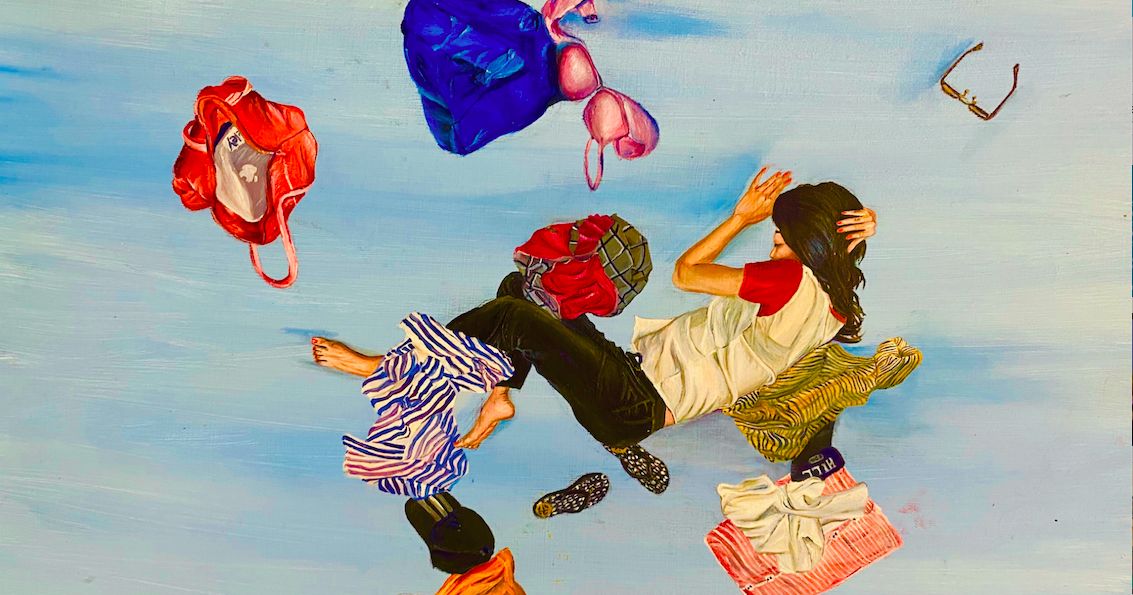Two hours deep into a thrifting haul, as your vision blurs and the polka-dot blouse and cat crop-top in front of you seem to merge, it feels like you’ll never be able to stop. You’ve found cute pants and a jacket that are absolutely worth the price, and you’d love some nice new boots for the winter. The trip will cost less than $30 in total, adding a new variety to your wardrobe without draining your wallet. And best of all, you don’t have to feel bad about any of it; it’s all secondhand.
Giant shiny malls and their associations with American overconsumption have long been cast into a realm far away from the world of liberal environmentalism. Thrift stores, however, with their musty embrace of safe consumption, allow for the perfect vehicle of anti-capitalist capitalism. Since nothing’s new, it barely feels like you’re consuming anything. No resources have been used, so where’s the harm?
Statistics on the highly reduced carbon footprint of thrifting compared to shopping and articles on the benefits of secondhand clothes stand at the forefront, affirming that there’s nothing wrong. Beyond thrifting’s essential purpose of providing clothes for lower-income communities, sharing that you enjoy thrifting marks you as “one of the better ones.” Not only are you making a sacrifice for the sake of ecology, but it’s a sacrifice that’s fun.
And thrifting is fun, the perfect activity for gossiping with close friends or getting to know a new acquaintance. With Berkeley’s abundance of thrift stores, it’s impossible not to find a good spot nearby, calling out for the perfect afternoon with others. On top of that, fashion is fun, too. It’s liberating to express oneself with all the clothes one desires, and there’s an urge to stand out in the sea of well-dressed students on campus. Thrifting makes fashion accessible to more than just the rich.
Yet we know our overconsumption is destroying the planet. Our use of resources is getting worse by the year, quickly outrunning what the earth can naturally provide for us. It feels like our actual consumption isn’t the only thing increasing — our need to buy and indulge is racing ahead just as rapidly.
In a way, thrifting allows you to consume even more than shopping, thanks to its low prices and endless variety, allowing anyone to buy anything. There’s a sentiment that if you’re unsure of an item, it’s better to just buy it anyway. There’s not much to lose, and it’s better not to risk missing out on something you want.
The joys of capitalism have been so deeply ingrained into our society that it’s often hard to step back and see where the actual joy lies. There is a lack of permanence in the things we buy, with promises of new deals and new items constantly lurking around the corner. Thrifting as a hobby isn’t always just an activity to fulfill a need for clothes, fashion or outward expression, but an attempt to scratch the itch telling us that having more stuff will make us happier.
Of course, there wouldn’t be much harm if this itch only applied to thrifting. But it’s difficult to isolate a consumerist mindset to only environmentally friendly spaces — to leave one’s urges within the thrift store. Once certain desires are fed, you can’t suppress the hunger when it reappears.
Just as thrifting allows you to obtain all the old clothes you want, why shouldn’t you also be able to get all the new clothes you want? What about the most recent iPhone? And your dream car? Or the beach vacation house you’ve always envisioned for your summers? What will you buy as your paychecks get bigger? As money grows, the desire only gives way to more destructive consumption.
Even within environmentalist action, our first priority is often not the environment. Instead, we prioritize a more environmentally friendly form of consumption, ultimately being led by environmentally destructive mindsets. Environmentalism becomes dependent on action, not thought.
At UC Berkeley, the culture of thrifting thrives, becoming more and more popular with each local shop, student clothing organization and cute outfit seen around campus.
Yet an undercurrent of environmentalism and anti-consumerism flows throughout UC Berkeley as well. It seems essential for that undercurrent to emerge and highlight the importance of us caring for what we have because it is all that we have.
This isn’t to say that we should abandon thrifting. On the contrary, more people should opt for secondhand clothes over fast fashion and other forms of shopping. Additionally, thrift stores must continue to exist to clothe those who cannot afford other options.
However, we desperately need to reconsider our reasons for consumption and shift our social interactions and our happiness away from consumerism.
Don’t stop thrifting. Don’t stop enjoying fashion and self-expression. Don’t stop replacing activities with more environmentally friendly alternatives. But consider whether you are buying because it will add value to your life or whether you are buying because you can do it without repercussions. Because in the end, a lack of repercussion in action does not promise a lack of repercussion in thought.

